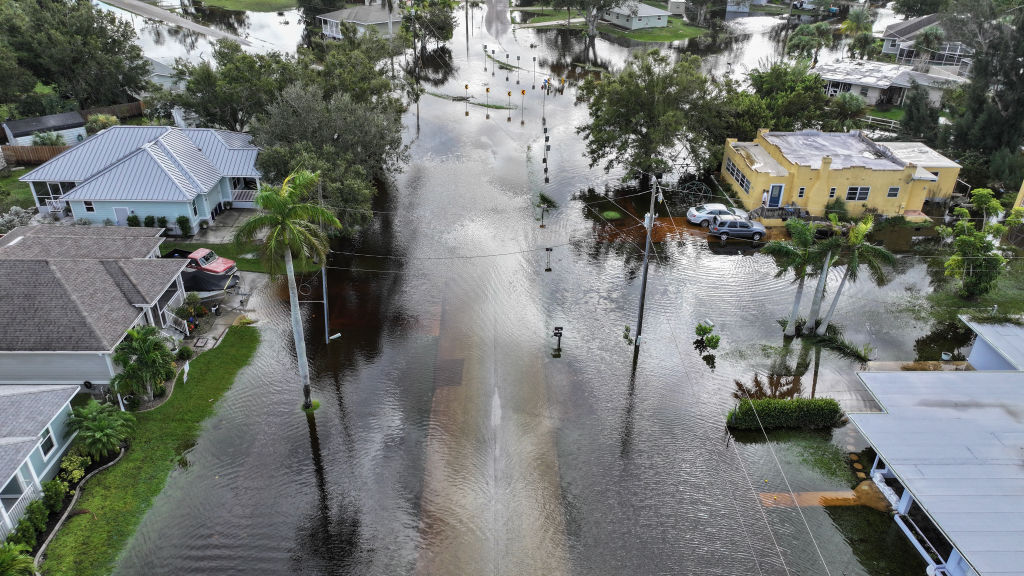Look Out for Scams and Price Gouging Amid Hurricanes, Officials Warn
Storm fraud and price gouging are a real threat after a natural disaster. Victims of hurricanes Helene and Milton are being urged to stay vigilant.


Profit and prosper with the best of Kiplinger's advice on investing, taxes, retirement, personal finance and much more. Delivered daily. Enter your email in the box and click Sign Me Up.
You are now subscribed
Your newsletter sign-up was successful
Want to add more newsletters?

Delivered daily
Kiplinger Today
Profit and prosper with the best of Kiplinger's advice on investing, taxes, retirement, personal finance and much more delivered daily. Smart money moves start here.

Sent five days a week
Kiplinger A Step Ahead
Get practical help to make better financial decisions in your everyday life, from spending to savings on top deals.

Delivered daily
Kiplinger Closing Bell
Get today's biggest financial and investing headlines delivered to your inbox every day the U.S. stock market is open.

Sent twice a week
Kiplinger Adviser Intel
Financial pros across the country share best practices and fresh tactics to preserve and grow your wealth.

Delivered weekly
Kiplinger Tax Tips
Trim your federal and state tax bills with practical tax-planning and tax-cutting strategies.

Sent twice a week
Kiplinger Retirement Tips
Your twice-a-week guide to planning and enjoying a financially secure and richly rewarding retirement

Sent bimonthly.
Kiplinger Adviser Angle
Insights for advisers, wealth managers and other financial professionals.

Sent twice a week
Kiplinger Investing Weekly
Your twice-a-week roundup of promising stocks, funds, companies and industries you should consider, ones you should avoid, and why.

Sent weekly for six weeks
Kiplinger Invest for Retirement
Your step-by-step six-part series on how to invest for retirement, from devising a successful strategy to exactly which investments to choose.
As if two deadly hurricanes in a month haven’t been enough to contend with, residents in Florida and other Southeastern states are also being urged to watch out for storm fraud and price gouging. That’s the message from authorities including the Federal Communications Commission (FCC) and state attorneys general, who have all issued warnings to consumers about a potential surge in scams and unfair trade practices resulting from hurricanes Helene and Milton.
Stories of alleged price gouging on flights were already circulating as Floridians prepared to escape the path of the storm on Wednesday, although airlines swiftly hit back against accusations, as they had following Hurricane Irma in 2017.
In the aftermath of a hurricane, consumers should be alert to businesses potentially overcharging for even the most basic goods and services, including bottled water, gas and accommodation, officials said.
From just $107.88 $24.99 for Kiplinger Personal Finance
Become a smarter, better informed investor. Subscribe from just $107.88 $24.99, plus get up to 4 Special Issues

Sign up for Kiplinger’s Free Newsletters
Profit and prosper with the best of expert advice on investing, taxes, retirement, personal finance and more - straight to your e-mail.
Profit and prosper with the best of expert advice - straight to your e-mail.
South Carolina Attorney General Alan Wilson explained: “We can expect normal price increases, and those are not considered price gouging under our law. But we may see businesses and individuals looking to unfairly take advantage of the situation.” Over in North Carolina, Attorney General Josh Stein said: “Unfortunately, there’s always going to be a few folks out there who take advantage of this moment and people’s desperation to make a quick buck.”
As well as unscrupulous, albeit genuine, businesses, homeowners may also encounter fraudsters posing as legitimate traders. The FCC warns: “Scammers use phone, text, mail, email and even go door to door to target residents of affected areas following hurricanes and damaging storms.”
Home repair, tree service and water testing and treatment scams are among the most prevalent in the wake of a natural disaster, according to the Florida Attorney General’s Office, while insurance fraud and identity theft are also a risk. Scammers may even pose as representative of charities asking for donations for disaster relief.
Laws around price gouging, and what constitutes price gouging, are typically set state by state (Democratic presidential nominee Kamala Harris has called for a federal ban on corporate price gouging) and are often triggered by states of emergency. In South Carolina, for example, state law stipulates it's gouging to rent or sell something at "an unconscionable price," which can mean the price "grossly exceeds the average price at which the same" item or dwelling "was readily obtainable in the trade area during the 30 days immediately before a declaration of a state of emergency."
How to avoid storm fraud
Scammers know that people are at their most vulnerable when in distress, but following a few simple rules should help homeowners avoid falling victim to fraud. The FTC has also published practical advice on how to avoid scams before and after a weather emergency.
Unsolicited approaches from traders at the door or on the phone are an immediate red flag. Never give insurance policy numbers, coverage details or other personal information out to a third party you haven’t entered into a contract with. Use the Better Business Bureau to check traders’ credentials and never pay the full amount of a repair upfront. Only donate to trusted, well-known charities, and be especially wary of crowd-funding requests on social media.
Anyone who encounters a scam or price gouging after a hurricane or other natural disaster should report it to their state attorney general or the Federal Trade Commission (FTC) at ReportFraud.ftc.gov. In Florida, you can visit MyFloridaLegal.com or call 1-866-966-7226, a price gouging hotline open for the hurricane.
FTC Chair Lina M. Khan said: “No American should have to worry about being ripped off … In partnership with state enforcers, the FTC will keep fighting to ensure that Americans can get the relief they need without being preyed on by bad actors exploiting a crisis.”
Related content
Profit and prosper with the best of Kiplinger's advice on investing, taxes, retirement, personal finance and much more. Delivered daily. Enter your email in the box and click Sign Me Up.

Charlotte comes to Kiplinger with more than two decades of experience in print and online journalism in the UK, with a focus on consumer rights, personal finance and law. She has worked for leading consumer rights organisation Which? and the UK government, and studied modern and medieval languages at the University of Cambridge.
-
 You Received a Life Insurance Payout. Here's How to Avoid an IRS Audit.
You Received a Life Insurance Payout. Here's How to Avoid an IRS Audit.You received a big check from your loved one's life insurance policy. Will the IRS be expecting a check from you now?
-
 Supreme Court Strikes Down Trump Tariffs: What's Next for Consumers and Retailers?
Supreme Court Strikes Down Trump Tariffs: What's Next for Consumers and Retailers?Tax Law This landmark decision will reshape U.S. trade policy and could define the outer boundaries of presidential economic power for years to come.
-
 Before You Go to Costco, Try This Grocery Strategy First
Before You Go to Costco, Try This Grocery Strategy FirstA simple shift in how you plan meals could help you spend and waste less.
-
 Is Life Insurance Taxable When It's Paid Out?
Is Life Insurance Taxable When It's Paid Out?You received a big check from your loved one's life insurance policy. Will the IRS be expecting a check from you now?
-
 Before You Go to Costco, Try This Grocery Strategy First
Before You Go to Costco, Try This Grocery Strategy FirstA simple shift in how you plan meals could help you spend and waste less.
-
 Are You Making These 3 Savings Mistakes?
Are You Making These 3 Savings Mistakes?Avoiding these common mistakes can help you build a foundation of wealth while not leaving thousands of dollars on the table.
-
 I'm a Financial Planner: These Small Money Habits Stick (and Now Is the Perfect Time to Adopt Them)
I'm a Financial Planner: These Small Money Habits Stick (and Now Is the Perfect Time to Adopt Them)February gets a bad rap for being the month when resolutions fade — in fact, it's the perfect time to reset and focus on small changes that actually pay off.
-
 One of the Most Powerful Wealth-Building Moves a Woman Can Make: A Midcareer Pivot
One of the Most Powerful Wealth-Building Moves a Woman Can Make: A Midcareer PivotIf it feels like you can't sustain what you're doing for the next 20 years, it's time for an honest look at what's draining you and what energizes you.
-
 I'm a Wealth Adviser Obsessed With Mahjong: Here Are 8 Ways It Can Teach Us How to Manage Our Money
I'm a Wealth Adviser Obsessed With Mahjong: Here Are 8 Ways It Can Teach Us How to Manage Our MoneyThis increasingly popular Chinese game can teach us not only how to help manage our money but also how important it is to connect with other people.
-
 Looking for a Financial Book That Won't Put Your Young Adult to Sleep? This One Makes 'Cents'
Looking for a Financial Book That Won't Put Your Young Adult to Sleep? This One Makes 'Cents'"Wealth Your Way" by Cosmo DeStefano offers a highly accessible guide for young adults and their parents on building wealth through simple, consistent habits.
-
 My Spouse and I Are Saving Money for a Down Payment on a House. Which Savings Account is the Best Way to Reach Our Goal?
My Spouse and I Are Saving Money for a Down Payment on a House. Which Savings Account is the Best Way to Reach Our Goal?Learn how timing matters when it comes to choosing the right account.